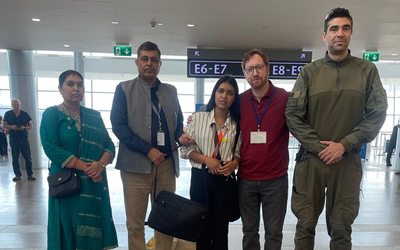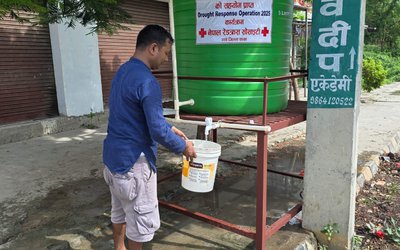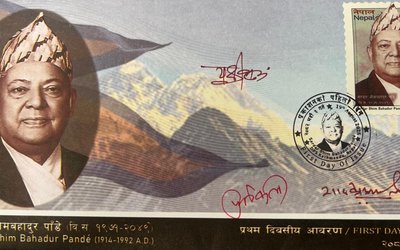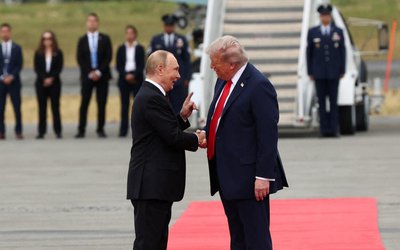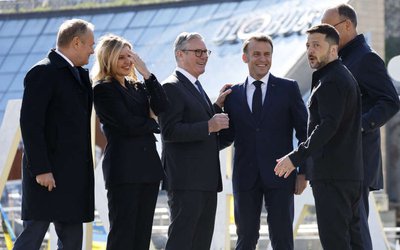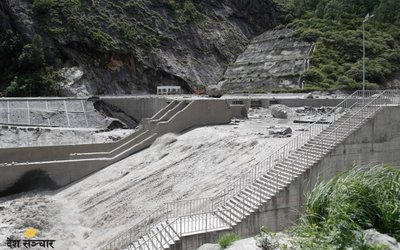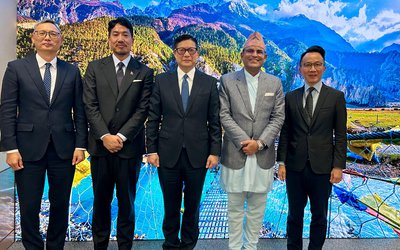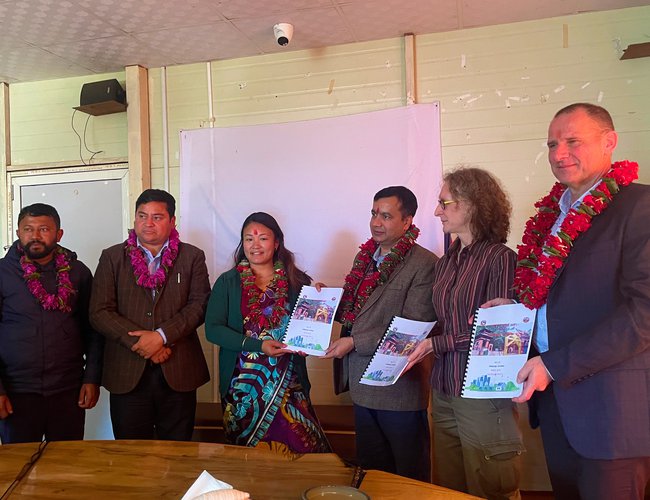
Caption: Jointly launching MEP In Halesi by mayor Bimala Rai, Nawa Raj Dhakal, Executive Director of the Alternative Energy Promotion Centre (AEPC); Dr Geertrui Louwagie, Deputy Head of Cooperation at the European Union Delegation to Nepal, Dr Frank Fecher, Programme Manager, and GIZ Nepal and others in February. Photo Courtesy REEEP-GREEN

A Woman Cooking in firewood in Halesi
In the hills of Khotang, Halesi Tuwachung Municipality, located 240 kilometers east of Kathmandu, is making strides in clean energy adoption and energy efficiency. With the technical support from AEPC, Mayor Bimala Rai Tilung is leading the implementation of the MEP.
Home to over 200 hotels and a revered destination for Hindu and Buddhist pilgrims, Halesi is transitioning from traditional energy sources to clean energy alternatives and empowering the people through power. Hoteliers and tea shop owners are switching from LPG and firewood to electric stoves and sustainable alternatives.
Prem Shrestha, owner of Halesi Royal Hotel, mentioned the municipality's support in upgrading transformers for reliable electricity, enabling the use of induction stoves and eco-friendly leaf plates.
Dhan Bahadur Basnet, a tea stall owner near Halesi temple, now uses an induction cooker and rice cooker, reducing his monthly reliance on LPG cylinders from three to one.
The municipality has approved the five years Municipal Energy Plan (MEP) with a budget of Rs. 1 billion (approx. 6 Million Euro). The plan emphasizes using green electricity and renewable energy—particularly solar power—to lift water from the Sunkoshi and Dudh Koshi rivers for irrigation and drinking water. The plan also includes detailed feasibility studies for two solar lift irrigation projects and outlines over 30 cost-effective activities based on market assessments.
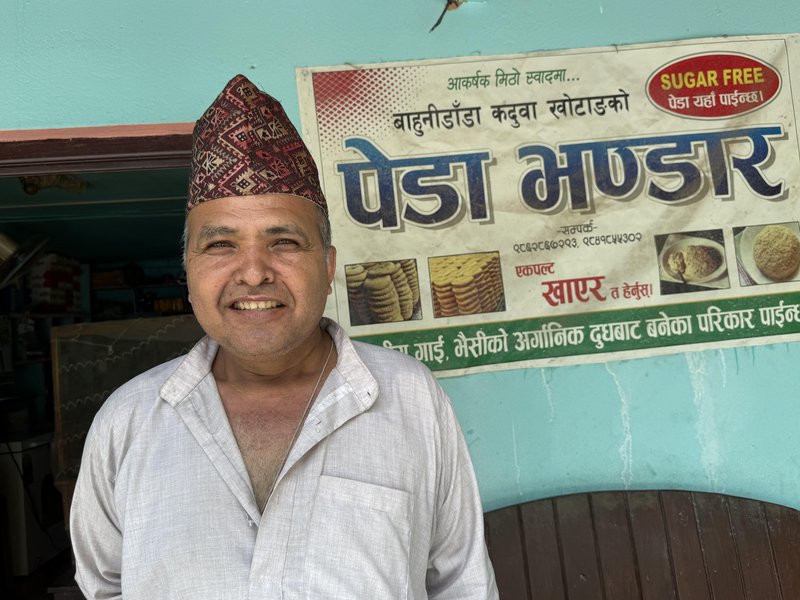
Dairy Onwer Karki
Empowering Local Industry and Livelihoods
Developed through inclusive consultations, the MEP provides a comprehensive framework for sustainable energy planning, focusing on local prosperity and environmental conservation.
The MEP has transformed local energy practices and mindset, demonstrating that sustainable and green energy solutions can benefit livelihoods and community pride. Mayor Rai and her team have gained valuable insights through their participation in the MEP process, using it as a learning tool and roadmap for sustainable energy initiatives.
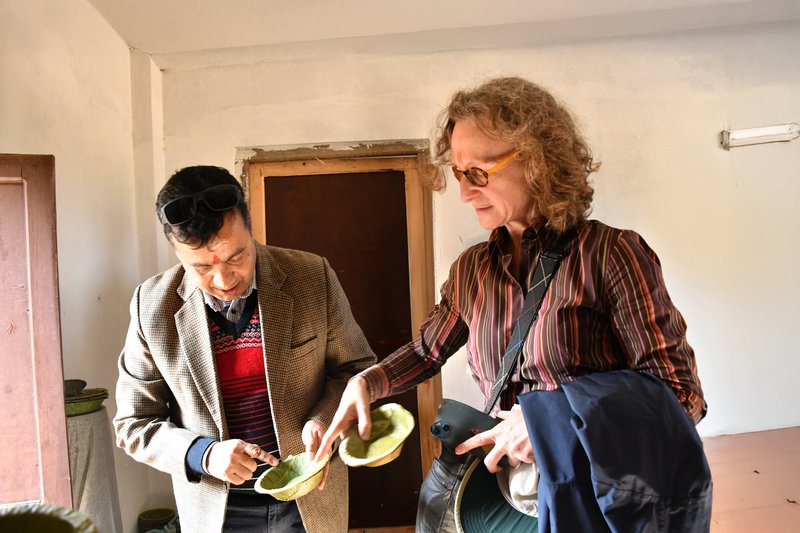
Caption: Nawa Raj Dhakal (Left), Executive Director of the Alternative Energy Promotion Centre (AEPC) and Dr Geertrui Louwagie, Deputy Head of Cooperation at the European Union Delegation to Nepal inspecting leaf plate during their visit in Halesi in February. Photo Courtesy REEEP-GREEN
Mayor Rai is actively encouraging local businesses to use electricity from the central grid. Enterprises, such as dairies, a bakery, and leaf plate manufacturing enterprise, are already reaping the benefits of clean energy solutions supported by the municipality and the REEEP-GREEN project.
The leaf plate enterprise, owned by a women's cooperative, is producing leaf plates to reduce plastic waste and promote sustainability at the sacred site of Halesi and beyond. The owner highlighted the role of electricity in creating jobs, improving livelihoods, and also encouraged women to seize this opportunity to expand their business and explore new markets.
Faud Singh Karki, owner of Halesi-Tuwachung Dairy in Bahun Danda (Ward 1), shared: “Since connecting to the grid, our LPG and petrol use has halved. We used to rely on petrol generators for refrigeration and LPG for cooking—now, we use electricity for both.”
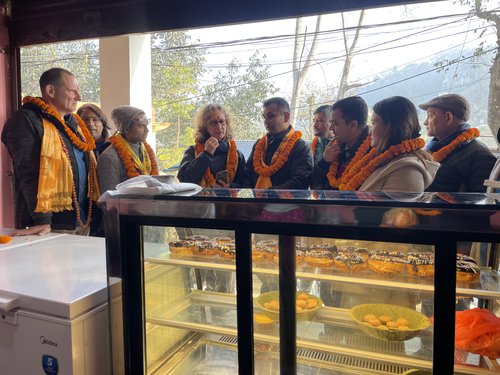
Caption: Inspecting Dairy and sweet store in Halesi Photo Courtesy REEEP-GREEN
In addition to businesses, households are also shifting to clean cooking solutions. Suntali Nepali, 18, and her sister Juna Nepali, 20, from Ward 1 of Halesi Tuwachung Municipality, used to / or need to gather leaf and firewood in the forest twice a month. With the grid connection, families like theirs have reduced their dependence on biomass, LPG and petrol.
The municipality’s electrification initiative, that started two years ago, has achieved 80% coverage in the municipality. Mayor Rai is seeking collaboration with the federal and provincial governments, private sector, and development partners in Nepal to further this progress.
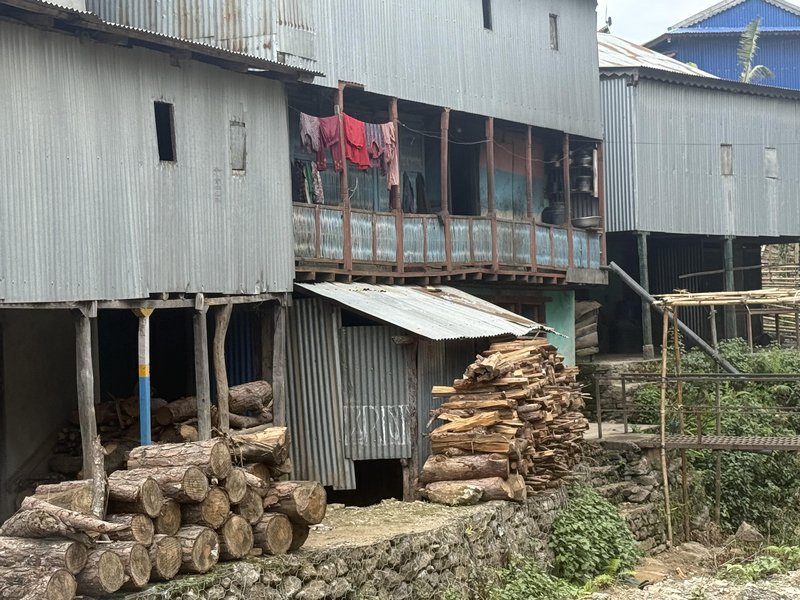
Fuel Wood for household use
From Energy Deficiency to Local Ownership
Previously, Haleshi Tuwachung Municipality, like many others in Nepal, lacked a local energy plan and depended on the federal government's energy planning. Several dysfunctional projects, such as solar lifting projects and solar grids, remain unused in the municipality, due to limited local involvement. For instance, a 1000-watt solar panel in Bahun Danda of Ward 1 sits idle, supported by the federal government.
"Two years ago, we declined 200 subsidized induction stoves from the federal government due to the lack of appropriate utensils for induction cooking. Instead, the municipality distributed 200 infrared stoves based on the people's needs," explained Mayor Rai.
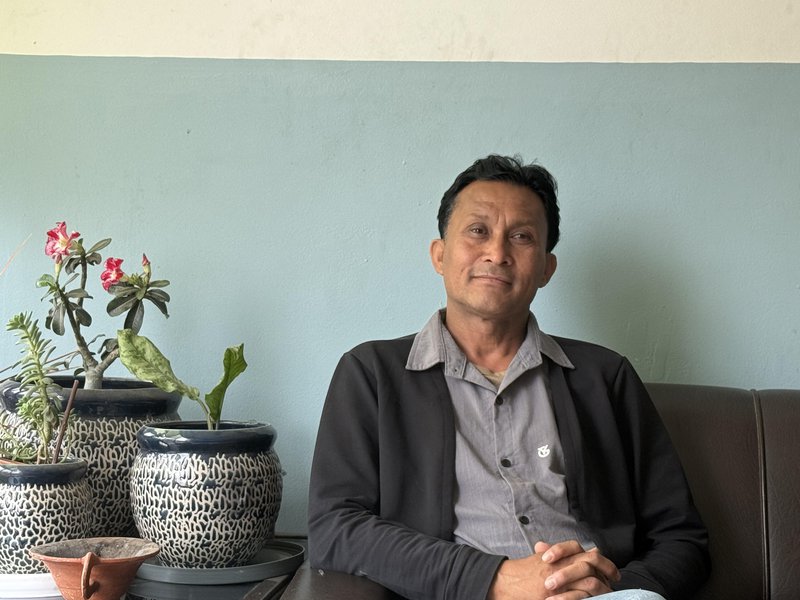
Hotel Owner Shrestha
The MEP has shifted this dynamic by placing planning power in the hands of local authorities. Dr. Mukesh Ghimire, Director at AEPC, confirmed that 16 municipalities, including Halesi Tuwachung, have completed their MEPs, while 55 more are in progress. “MEPs support municipalities in establishing frameworks for energy management and renewable integration,” he added.
Deputy Mayor Ramesh Kumar Raut highlighted the need for cost-effective and feasible outcomes in MEP implementation.
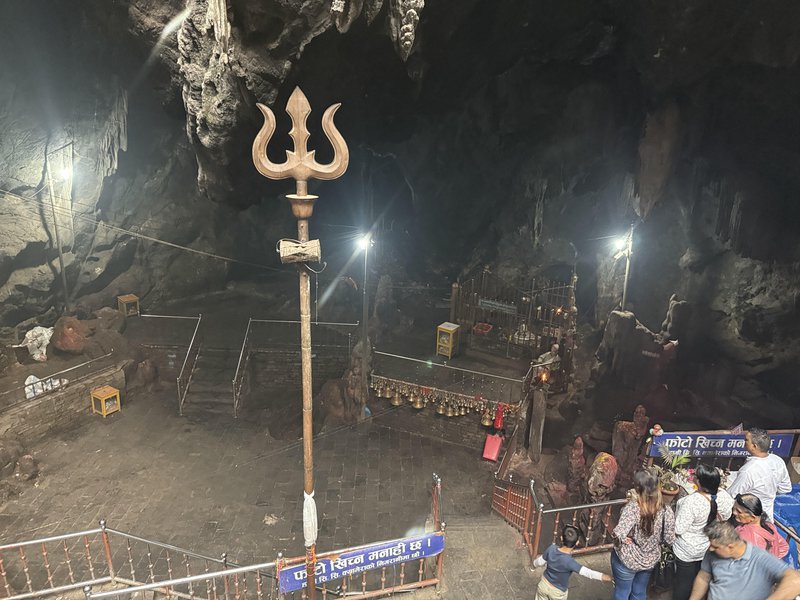
Halesi Temple with light
Inclusive and Equitable Energy Access
Women and marginalized communities, despite being key energy users, are often excluded from decision-making. .The MEP has intentionally prioritized inclusivity. "I have made every effort to include the voices of women and marginalized communities in the Municipal Energy Plan (MEP) with the motto 'power for empowerment.' Our energy subcommittee has ensured that all voices are represented in our MEP, making it one of the most inclusive," Mayor Rai stated.
The municipality is addressing water scarcity through solar-powered water lifting projects. They are planning to use solar pumps to extract water from major rivers, as recommended by the MEP. Mayor Rai has confirmed that the implementation is in its final stages and within the budget.
The plan outlines a nine-step process to guide energy initiatives over the next five years, focusing on renewable energy technologies for sustainable development.
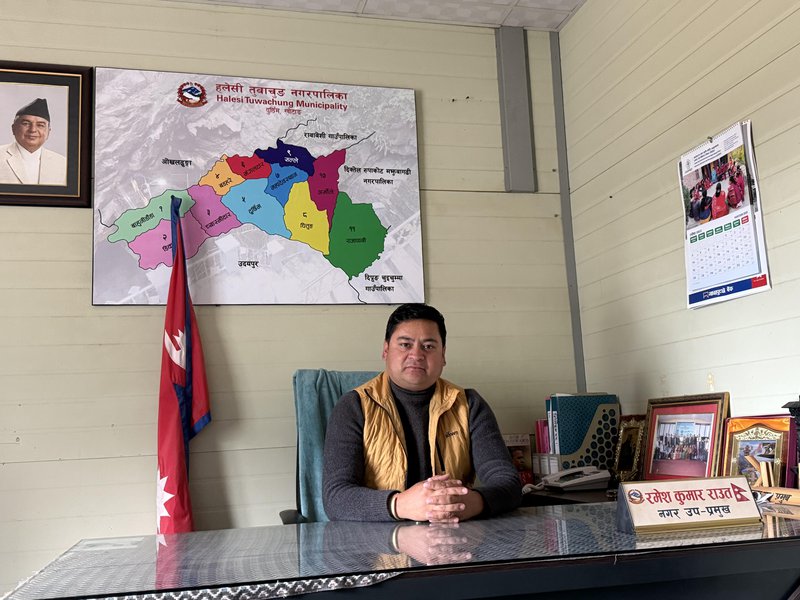
Deputy Mayor Ramesh Kumar Raut
About MEP
The MEP was developed through a nine-step planning process, including stakeholder identification, energy sub-committee formation, vision and mission creation, goal setting, strategy development, activity prioritization, funding source identification, plan compilation, finalization, implementation, and monitoring.
The plan aims to accelerate the deployment of Renewable Energy Technologies in municipalities cost-effectively and feasibly. It includes over 30 energy sector activities with cost estimates based on market assessments for feasibility and effectiveness. Detailed feasibility studies for two solar lift irrigation projects have been provided by REEEP-GREEN to offer sustainable agricultural solutions in the municipality.
Shift towards Green
Nepal's MEP represents a shift towards green, sustainable, decentralized energy governance in alignment with the country's federal structure and commitment to achieving Sustainable Development Goal 7 and supporting Nepal's NDC for zero emissions by 2045.
The MEP is a strategic tool for municipalities to create sustainable energy solutions tailored to their needs. It includes Energy Baseline Assessments, Renewable Energy Integration, and energy efficiency measures. Community engagement and capacity building are key components, empowering local governments to ensure equitable and sustainable energy access in Nepal.
In February, the Halesi MEP was jointly launched by mayor Rai, Nawa Raj Dhakal, Executive Director of the Alternative Energy Promotion Centre (AEPC); Dr Geertrui Louwagie, Deputy Head of Cooperation at the European Union Delegation to Nepal, Dr Frank Fecher, Programme Manager, and GIZ Nepal
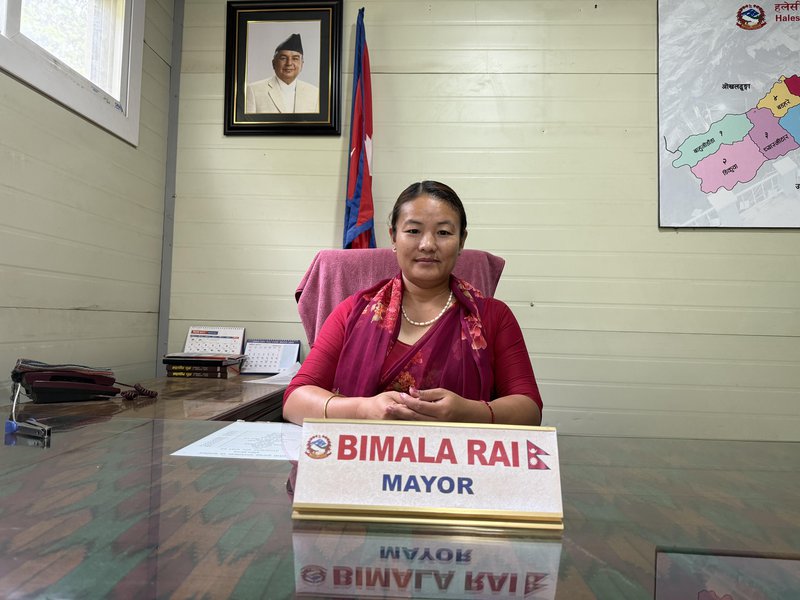
Caption: Mayor Rai
With technical support from the EU and Germany, the MEP has capacitated and empowered the local government to support Nepal’s journey toward zero emissions. Aligned with Nepal's target of achieving net-zero emissions by 2045, the MEP contributes to global climate goals by promoting green energy adoption and reducing carbon emissions.
- EU’S ERASMUS MUNDUS: Scholarship For Quality Education
- Aug 05, 2025
- ADB: Partnership For Growth
- Aug 04, 2025
- HCC-N: Economic Ambassador
- Aug 03, 2025
- MONETARY POLICY: Disappointing Outcome
- Jul 17, 2025
- MELAMCHI WATER SUPPLY: No Interruption During Monsoon
- Jun 25, 2025
